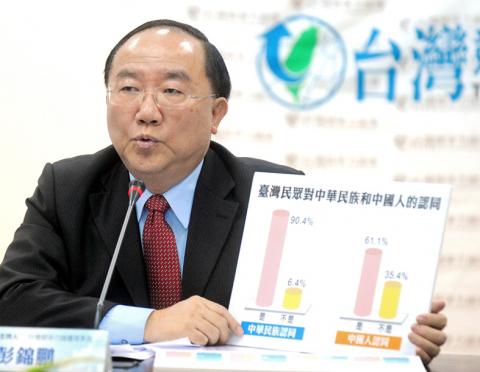Activists and netizens lashed out at Taiwan Competitiveness Forum chairman Thomas Peng (彭錦鵬) and Youth Career Development Association chairwoman Chiang Mei (江梅) over questions that they asked independent Taipei mayoral candidate Ko Wen-je (柯文哲) and his Chinese Nationalist Party (KMT) rival Sean Lien (連勝文) during a televised debate on Friday.
Representatives from six groups — with each candidate recommending three — were to ask questions. Peng and Chiang — recommended by Lien’s campaign — asked questions that were criticized by many as being biased.
Typically, questioners ask the same question of each candidate to evaluate their thoughts on a particular issue, but Peng and Chiang asked separate questions of Ko and Lien.

Photo: Taipei Times
Peng accused Ko of illegally operating the MG149 bank account associated with the National Taiwan University Hospital and asked if Ko would also set up such accounts if elected. Peng then asked Lien why he would risk his life to run in the mayoral election after surviving a gunshot during a campaign in 2010.
Chiang asked Ko to explain why he had torn a Republic of China national ID during a rally for a pro-independence group and if he would support Taiwanese independence after being elected. Chiang then asked Lien to explain his ideas about helping young people in the city in career development.
Peng Yang-kai (彭揚凱), chairman of the Organization of Urban Re-s and a questioner recommended by Ko’s campaign, said yesterday that he protested to the moderator.
“During the break after the first three questioners [recommended by Lien] finished their questions, I immediately went to the moderator and asked her if it was okay for them to ask two separate questions of the two candidates,” Peng Yang-kai said on Facebook. “The organizer called a quick meeting and concluded that it would be okay, since the first three had already done so.”
Peng Yang-kai, who was set to be the final questioner, said that he decided to ask Lien — who lives in The Palace (帝寶) luxury apartment complex — to explain the five major appeals made by the housing movement, and asked him about the number of real-estate properties that the Lien family owns.
Sunflower movement student leader Lin Fei-fan (林飛帆), who is a graduate student at National Taiwan University’s (NTU) Department of Political Science, also chastised Thomas Peng, a NTU political science professor.
Meanwhile, more than 2,100 people — as of press time last night — had signed an online petition declaring: “I am a political science student at NTU; I decline to be represented by Thomas Peng.”
Thomas Peng said that he is a KMT member, but insisted that he was critical of both candidates.
“I was not representing the school, but if the students are upset about my questions, that is probably because they have not studied well enough,” he said.
Ko said yesterday thathe was a little shocked.
“I was a little, um, I would describe it with the English word ‘upset,’ by the first two questioners,” Ko said. “It was odd. How would they ask such questions?”
Ko added that he has no right to tell others what they should do.
“I could only do my part to the best I can,” he said.

NATIONAL SECURITY THREAT: An official said that Guan Guan’s comments had gone beyond the threshold of free speech, as she advocated for the destruction of the ROC China-born media influencer Guan Guan’s (關關) residency permit has been revoked for repeatedly posting pro-China content that threatens national security, the National Immigration Agency said yesterday. Guan Guan has said many controversial things in her videos posted to Douyin (抖音), including “the red flag will soon be painted all over Taiwan” and “Taiwan is an inseparable part of China,” while expressing hope for expedited “reunification.” The agency received multiple reports alleging that Guan Guan had advocated for armed reunification last year. After investigating, the agency last month issued a notice requiring her to appear and account for her actions. Guan Guan appeared as required,

Japan and the Philippines yesterday signed a defense pact that would allow the tax-free provision of ammunition, fuel, food and other necessities when their forces stage joint training to boost deterrence against China’s growing aggression in the region and to bolster their preparation for natural disasters. Japan has faced increasing political, trade and security tensions with China, which was angered by Japanese Prime Minister Sanae Takaichi’s remark that a Chinese attack on Taiwan would be a survival-threatening situation for Japan, triggering a military response. Japan and the Philippines have also had separate territorial conflicts with Beijing in the East and South China

A strong cold air mass is expected to arrive tonight, bringing a change in weather and a drop in temperature, the Central Weather Administration (CWA) said. The coldest time would be early on Thursday morning, with temperatures in some areas dipping as low as 8°C, it said. Daytime highs yesterday were 22°C to 24°C in northern and eastern Taiwan, and about 25°C to 28°C in the central and southern regions, it said. However, nighttime lows would dip to about 15°C to 16°C in central and northern Taiwan as well as the northeast, and 17°C to 19°C elsewhere, it said. Tropical Storm Nokaen, currently

PAPERS, PLEASE: The gang exploited the high value of the passports, selling them at inflated prices to Chinese buyers, who would treat them as ‘invisibility cloaks’ The Yilan District Court has handed four members of a syndicate prison terms ranging from one year and two months to two years and two months for their involvement in a scheme to purchase Taiwanese passports and resell them abroad at a massive markup. A Chinese human smuggling syndicate purchased Taiwanese passports through local criminal networks, exploiting the passports’ visa-free travel privileges to turn a profit of more than 20 times the original price, the court said. Such criminal organizations enable people to impersonate Taiwanese when entering and exiting Taiwan and other countries, undermining social order and the credibility of the nation’s